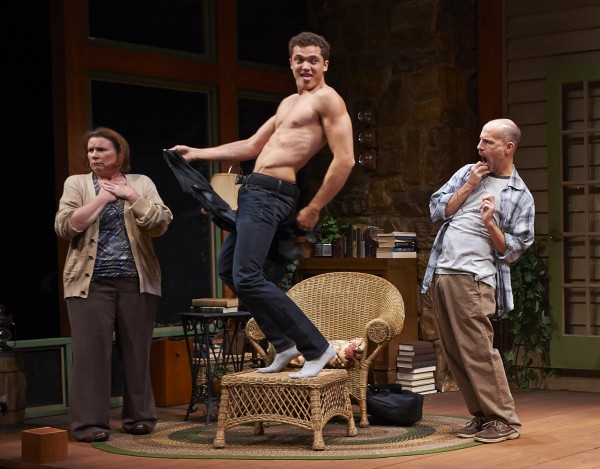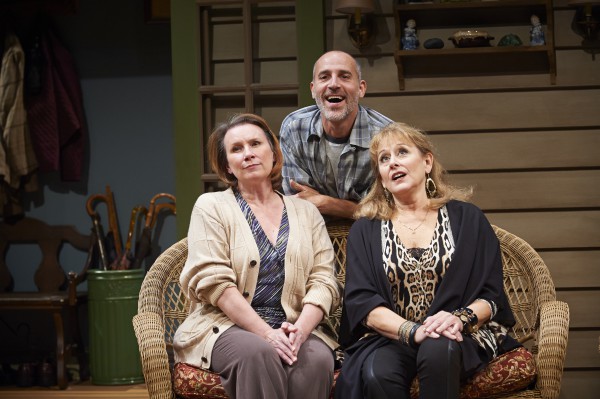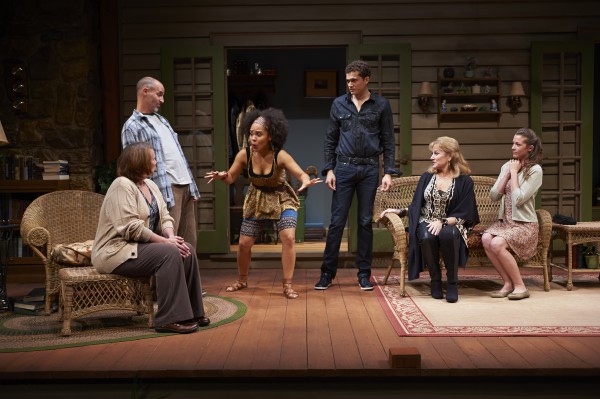‘Vanya and Sonia and Masha and Spike’: How Chekhov Gets What He Deserves
- Like
- Digg
- Del
- Tumblr
- VKontakte
- Buffer
- Love This
- Odnoklassniki
- Meneame
- Blogger
- Amazon
- Yahoo Mail
- Gmail
- AOL
- Newsvine
- HackerNews
- Evernote
- MySpace
- Mail.ru
- Viadeo
- Line
- Comments
- Yummly
- SMS
- Viber
- Telegram
- Subscribe
- Skype
- Facebook Messenger
- Kakao
- LiveJournal
- Yammer
- Edgar
- Fintel
- Mix
- Instapaper
- Copy Link

Take that, you intellectual Russophiles! Spike (Karl Glusman) does the un-Chekhovian loose booty for Sonia (Sheila McKenna) and Vanya (Harry Bouvy).
Vanya and Sonia and Masha and Spike, now at City Theatre, is the 2013 Tony Award winner for Best Play. Yet I’ve talked to people who are hesitant to see it, due to what one friend called “the Chekhov factor.” Allow me to ease their concerns.
The play, written by Christopher Durang, is an over-the-top comedy. And yes, it’s a modern take on Anton Chekhov. The title characters, except for Spike, have names drawn from Chekhov’s plays, such as his Uncle Vanya of 1898. Plot elements come from The Seagull and other plays. There are references to Chekhov throughout.
But many avid theater fans today have little acquaintance with the late Russian, so they rightly wonder: Will the over-the-top humor go over my head? Will the Chekhov intellectuals be laughing their ample behinds off, while I just won’t get it?
Relax. Durang’s play lets you know, from the start, that this will be a riff on the typical Chekhov theme: smart, sensitive people feeling angst and despair at the absurdity and unfairness of life. As long as you think that’s fair game for fun, you are set. The play might actually work better if you are not watching for all the little insider references.
When Sonia (played by Sheila McKenna) mournfully announced, in her drama-queen mode, “I am a wild turkey,” I laughed because it struck me as a ridiculous bolt from the blue. Only later—after looking it up—did I recall that, yep, it’s a twist on a Chekhov line, one in which a woman says, “I am a seagull.” Moreover, the big payoff scene in Vanya and Sonia, et al. is a dynamite soliloquy that has nothing to do with Chekhov or Mother Russia. However, if you think some context would help, here’s a basic brief.
The Backstory
Anton Chekhov went to his grave in 1904 feeling oddly misunderstood. He had insisted that his plays were, in fact, comedies, satires of the era’s angst and so forth. But theater companies of the time (notably the Moscow Art Theater, led by Chekhov’s friend Constantin Stanislavski) played them as wrenching tragedies. And when audiences reacted with thunderous, tearful standing ovations, what was Chekhov to do but shake his head and perhaps chuckle existentially, all the way to fame and fortune?
He may still be chuckling somewhere. The subtle qualities of his plays made them notoriously difficult to perform, or to enjoy properly. Over the years, ecstatic ovations grew rare. The more common reaction became “huh?” The fundamental insider joke is that people never did get (and still don’t get) the original Chekhov. Get it?
So Durang and the members of the production at City Theatre have tried to do us a favor. They’ve given us a Chekhov 2.0, set in a wealthy exurb of Philadelphia, with the satire done so blatantly—bordering on Chekhov meets the Marx Brothers—that nobody could possibly not get it.
Sex, Death and Pandemonium
We learn the drill quickly when the lights go up on Vanya (Harry Bouvy) and Sonia, a brother and sister in late middle age. They have spent their prime years as the unemployed stay-at-home children, and now that their parents are deceased, they’re busy driving each other nuts.
Vanya, the passive aggressor, observes that Sonia hasn’t prepared his morning coffee quite right, then takes umbrage when she takes umbrage: “It’s no big deal,” he says. “I’m just making pleasant conversation.” At last, she offers to fix it for him, then flings his coffee mug smash-o against the wall.
Vanya (after a double-take): “What kind of response is that?”
Sonia (ferociously): “It’s an angry, I-hate-my-life and I-hate-you response.”
Vanya (in a Groucho deadpan): “Well, it was effective.”
The crossfire escalates when their famous sister arrives for a visit. Masha (Helena Ruoti) is an aging film star who sweeps in diva-like, but soon reveals her celebrity angst. When young she had dreamed of playing Chekhov on stage. Instead she found stardom by accepting the lead in a movie called Sexy Killers.

Are they really happy or just acting? For Sonia, Vanya, and their leopardskin-clad sister Masha (Helena Ruoti), that is the question.
To complicate matters, Masha has exited as many bad marriages as Sexy Killers had sequels, and now she shows up with her new squeeze. Spike (Karl Glusman) is a gorgeous young lizard who (a) longs to be big in show biz, (b) shamelessly fondles the much older Masha in front of her sex-starved siblings, and (c), like Harpo, is fond of stripping to his undies in public. Unlike Harpo, Spike speaks. Obnoxiously.
There’s more. Vanya and Sonia have a housemaid, Cassandra (Amirah Vann), named after the prophet in Greek mythology cursed to make prophecies that would always come true but were never believed. Whereas the servants in Chekhov’s plays tend to be minor characters, Cassandra storms and whirls across the stage like the scenery-chewing tree-shredder of destiny, issuing dire warnings to beware this or beware that.
Actors Behaving Badly…and What Makes It Good
Two patterns run through the play, both tricky to pull off. One is this: For the humor to work, the actors must play bad actors, and you have to be good to do a good job of acting badly. Cassandra, Masha and Spike are insufferable stage hogs. The trick in presenting them is to make the audience not suffer, but laugh. The same is true when Vanya and Sonia take their own long-suppressed stabs at the dramatic arts, and likewise when a sixth character, a pretty, perky young visitor named Nina (Hayley Nielsen) turns out to be yet another aspiring thespian.
Most of the time, on the preview night when I went, the City Theatre cast hit the sweet spot in terms of bad acting done well. They also stayed in the groove despite having a tough audience for comedy that night. The crowd was polite but quiet. (People barely tittered when Cassandra crooned her ultimate warning—“Bewaaare the future!”—followed by, “I know you will not abide me, you will ignore me, because I am not tall.”)

Cassandra (Amirah Vann) prophesies dark days ahead for our anti-heroic ensemble, but everyone—even dear naive Nina (Hayley Nielsen, far right)—will have a turn in the spotlight.
The second pattern is a sneaky one. Amid the wackiness, the play is designed to become seriously touching, as the characters gradually shed the roles they have played and begin to find new ones, somewhere in the ballpark of reality. This requires making the audience care about the characters, not see them as merely stooges in a farce. On this score, director Tracy Brigden and the cast did well indeed.
The climatic point comes when a certain character—I won’t say who because it’s unexpected—explodes into a silly, yet magnificent, rant about everything that’s wrong with life as we know it. It is the Mother Of All Rants, lasting nearly as long as a Ginger Baker drum solo, a trite but riveting rant that you gotta love, if only for how much the ranter really means it.
Is it profound classical theater? No, nor is Vanya and Sonia and Masha and Spike a perfect play; there are places it goes for cheap laughs or settles for melodrama. But if a play can create just one memorable effect, an experience that absolutely rouses you and stays with you, it is worth seeing. For me, The Rant sealed the deal. And, oh, did it stir up that quiet audience.
Know what they gave the play at the end? A standing ovation. Good night, Mr. Chekhov, wherever you are.
Credits and Info
Vanya and Sonia and Masha and Spike, written by Christopher Durang and directed by Tracy Brigden, runs through Nov. 3 at City Theatre, 1300 Bingham St., South Side. For dates, times, and tickets visit City Theatre or call 412-431-CITY.
Photos courtesy City Theatre and Alex Jones.
Mike Vargo, an experienced, longtime writer and editor based in Pittsburgh, has himself performed on stage but “not very well,” he says. So he sticks to writing about it.
Share on Social Media
- Like
- Digg
- Del
- Tumblr
- VKontakte
- Buffer
- Love This
- Odnoklassniki
- Meneame
- Blogger
- Amazon
- Yahoo Mail
- Gmail
- AOL
- Newsvine
- HackerNews
- Evernote
- MySpace
- Mail.ru
- Viadeo
- Line
- Comments
- Yummly
- SMS
- Viber
- Telegram
- Subscribe
- Skype
- Facebook Messenger
- Kakao
- LiveJournal
- Yammer
- Edgar
- Fintel
- Mix
- Instapaper
- Copy Link
Follow Entertainment Central
Sign up for the EC Newsletter
Latest Stories







